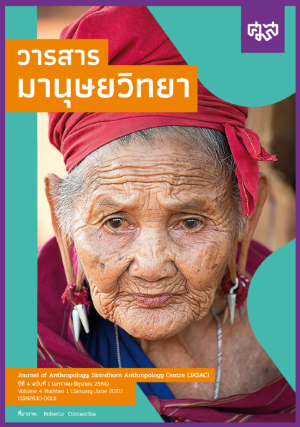จินตนาการชาติและความเป็นชาติของกะเหรี่ยงที่แตกเสี่ยง
Main Article Content
บทคัดย่อ
บทความเสนอให้เห็นว่าตลอดระยะเวลากว่า 70 ปีที่ผ่านมาของขบวนการเคลื่อนไหวชาตินิยมเชิงชาติพันธุ์ของชาวกะเหรี่ยงในกระบวนการสร้างชาติและรัฐอิสระได้ดำเนินไปภายใต้ความแตกเสี่ยงภายในของกลุ่มกะเหรี่ยงด้วยกันเอง ทั้งนี้หน่วยชาติพันธุ์กะเหรี่ยง (Karen) เป็นการประกอบสร้างขึ้นมาจากกลุ่มคนที่หลากหลายภายใต้ชุดความรู้ทางภาษาศาสตร์ชาติพันธุ์และการประมวลความเข้าใจทางวัฒนธรรมร่วมกันที่เกิดขึ้นมาในสมัยอาณานิคม ความเป็นชาติและการสร้างรัฐอิสระกะเหรี่ยงก็เป็นจินตนาการที่เกิดจากประดิษฐกรรมของแนวคิดรากเหง้าดั้งเดิมเพื่อสร้างสำนึกและความเป็นพวกเดียวกันของกะเหรี่ยงกลุ่มต่างๆ ในการขับเคลื่อนอุดมการณ์ชาตินิยม อย่างไรก็ตามจากพื้นฐานความแตกต่างของความหลากหลายในบรรดาชาวกะเหรี่ยง และสถานการณ์การแบ่งแยกขบวนการในการเคลื่อนไหวระหว่างกลุ่มกะเหรี่ยงคริสต์ (KNU) และกลุ่มกะเหรี่ยงพุทธ (DKBN) ที่พยายามแยกแยะอัตลักษณ์ที่แตกต่างและมีเป้าหมายของการสร้างดินแดนกะเหรี่ยงที่แตกต่างกัน ได้ชี้ให้เห็นว่าจินตนาการชาติและรัฐกะเหรี่ยงอิสระได้ดำเนินมาถึงจุดที่แตกเสี่ยงออกไปสู่การเป็นกะเหรี่ยงที่หลากหลายมากกว่าการเป็นกะเหรี่ยงที่เป็นเอกภาพเดียวกัน
Article Details

อนุญาตภายใต้เงื่อนไข Creative Commons Attribution-NonCommercial-NoDerivatives 4.0 International License.
ลิขสิทธิ์@ของวารสารมานุษยวิทยา
ศูนย์มานุษยวิทยาสิรินธร (องค์การมหาชน), กรุงเทพฯ, ประเทศไทย
ข้อมูลเพิ่มเติม:
https://creativecommons.org/licenses/by-nc-nd/4.0/
เอกสารอ้างอิง
ขวัญชีวัน บัวแดง. 2551. พื้นที่พรมแดนแม่น้ำเมยกับความสัมพันธ์ชาติพันธุ์กะเหรี่ยง-คนเมือง. เชียงใหม่: คณะสังคมศาสตร์ มหาวิทยาลัยเชียงใหม่.
ขวัญชีวัน บัวแดง. 2560. เครือข่ายพุทธศาสนาของชาวกะเหรี่ยงข้ามแดนไทย-เมียนมาร์. เชียงใหม่: ศูนย์วิจัยและบริการวิชาการ คณะสังคมศาสตร์ มหาวิทยาลัยเชียงใหม่.
จีระศักดิ์ เพชรตรา. 2541. ปัญหาที่ตั้งค่ายอพยพผู้ลี้ภัยชาวกะเหรี่ยงตามแนวชายแดนไทย-พม่า ที่อำเภอแม่สอด จังหวัดตาก.
วิทยานิพนธ์รัฐศาสตร์มหาบัณฑิต สาขาวิชาการเมืองและการปกครอง บัณฑิตวิทยาลัย มหาวิทยาลัยเชียงใหม่.
ดุลยภาค ปรีชารัชช. 2551. ผ่าการเมืองพม่า ความขัดแย้ง ความมั่นคง ในโลกที่ไร้พรมแดน. กรุงเทพฯ: โอเดียนสโตร์.
ดุลยภาค ปรีชารัชช. 2554. จับกระแส: ยุทธศาสตร์การเมืองพม่า. กรุงเทพฯ: โรงพิมพ์มหาวิทยาลัยธรรมศาสตร์.
ดุลยภาค ปรีชารัชช. 2554. ความเข้าใจเรื่องเขตแดนไทย-พม่า. ใน เขตแดนสยามประเทศไทย - มาเลเซีย - พม่า - ลาว - กัมพูชา.
ชาญวิทย์ เกษตรศิริ และคณะ (บก.), (หน้า 101–224). กรุงเทพฯ: มูลนิธิโครงการตำราสังคมศาสตร์และมนุษยศาสตร์.
นิติ ภวัครพันธุ์. 2553. ชวนถก ชาติและชาติพันธุ์. กรุงเทพฯ: สยามปริทัศน์.
บัณฑิต ไกรวิจิตร. 2559. การเผชิญกับภาพแทนของกะเหรี่ยงโผล่วในเขตรักษาพันธุ์สัตว์ป่าทุ่งใหญ่นเรศวร. ดุษฎีนิพนธ์ปรัชญาดุษฎีบัณฑิต (สหวิทยาการ) วิทยาลัยสหวิทยาการ มหาวิทยาลัยธรรมศาสตร์.
บัณฑิต ไกรวิจิตร. 2561. “การรวมชีวิตป่าเข้าสู่ปริมณฑลทางการเมืองหลากหลายสายพันธุ์: การพูดของชาวกะเหรี่ยงโผล่วคนเบี้ยล่าง”, วารสารมานุษยวิทยา. 1(2): 71-128.
พิเชฐ สายพันธ์. 2562. พลวัตชุมชนชาติพันธุ์กะเหรี่ยงฝั่งตะวันตกของประเทศไทย ในเขตตอนบนจังหวัดตากและกำแพงเพชร. รายงานวิจัยชุดโครงการศึกษาวิจัยพลวัตของชุมชนชาติพันธุ์กะเหรี่ยงเพื่อการสร้างแผนที่วัฒนธรรมมีชีวิต ปีที่ 1 (พ.ศ. 2562). กรุงเทพฯ: ศูนย์มานุษยวิทยาสิรินธร (องค์การมหาชน).
ภาวนีย์ บุญวรรณ. 2544. การศึกษาวิเคราะห์ความเชื่อพระพุทธศาสนาและฤาษีของชาวกะเหรี่ยงทุ่งใหญ่นเรศวร กรณีศึกษา หมู่บ้านสะเน่พ่อง ตำบลไร่โว่ อำเภอสังขละบุรี จังหวัดกาญจนบุรี. วิทยานิพนธ์อักษรศาสตร์มหาบัณฑิต สาขาวิชาศาสนาเปรียบเทียบ บัณฑิตวิทยาลัย มหาวิทยาลัยมหิดล.
ยศ สันตสมบัติ. 2551. “มานุษยวิทยาว่าด้วยรัฐ: บทสำรวจความคิดและพลังของมานุษยวิทยา”. ใน รัฐจากมุมมองชีวิตประจำวัน. (หน้า 10-44). กรุงเทพฯ: ศูนย์มานุษยวิทยาสิรินธร (องค์การมหาชน).
ยศ สันตสมบัติ, และคณะ. 2556. อนุภูมิภาคลุ่มน้ำโขงใต้ชะเงื้อมสี่เหลี่ยมเศรษฐกิจ. เชียงใหม่: ศูนย์ศึกษาความหลากหลายทางชีวภาพและภูมิปัญญาท้องถิ่นเพื่อการพัฒนาที่ยั่งยืน.
Anderson, B. 1983. Imagined Community: Reflections on the Origin and Spread of Nationalism. London: Verso Editions and NBL.
Ardeth, M. T. 2012. The “Other” Karen in Myanmar: Ethnic Minorities and the Struggle without Arms. United Kingdom: Lexington Books.
Aung, M. H. 1967. A History of Burma. New York: Columbia University Press.
Chisholm, H. (Ed.). 1911. “Karen-Ni”, Encyclopedia Britannica. 15 (11th ed). Cambridge University Press.
Giddens, A. 1989. Sociology. Cambridge: Polity Press.
Gravers, M. 1996. “The Karen Making of a Nation”. In Stein Tonnesson and Hans Antlov (Eds.), Asian Forms of Nation. (pp. 237-269). Richmond, Surrey: Curzon Press.
Hamilton, J. W. 1976. Pwo Karen: At the Edge of Mountain and Plain. Library of Congress Cataloging in Publication Data, USA: West Publishing.
Hovemyr, A. P. 1989. In search of the Karen King: A Study in Karen Identity with Special Reference to 19th Century Karen Evangelism in Northern Thailand. Studia Missionalia Upsaliensia XLIX. The University of Uppsala.
Kato, A. 2003. “Pwo Karen”. In Thurgood, Graham and LaPolla, Randy J. (Eds.), The Sino-Tibetan Languages. (pp. 632-648). London and New York: Routledge.
Keyes, C. F. 1977. The Golden Peninsula. New York: MacMillan Publishing.
Keyes, C. F. 1979. Ethnic Adaptation and Identity: The Karen on the Thai Frontier with Burma. Philadelphia, Pennsylvania: Institute for the Study of Human Issues. Inc.
Lehman, F. K. 1967. “Ethnic Categories in Burma and the theory of social systems”. in Peter Kunstadter (Ed.), Southeast Asian Tribes, Minorities, and Nations. V.1. Princeton: Princeton University Press.
Lehman, F. K. 1979. “Who are the Karen, and If So, Why? Karen Ethnohistory and a Formal Theory of Ethnicity”. In Charles F. Keyes (Ed.), Ethnic Adaptation and Identity: The Karen on the Thai Frontier with Burma. (pp. 215-247). Philadelphia, Pennsylvania: Institute for the Study of Human Issues. Inc.
Pinkaew Laungaramsri. 2003. “Constructing Maginality: the ‘hill tribe’ Karen and their shifting locations within Thai state and public perspectives”. In Claudio O. Delang (Ed.), Living at the Edge of Thai Society: The Karen in the highlands of northern Thailand. (pp. 21-42). New York: RoutledgeCurzon.
Po, San C. C.B.E. 2001 (1928). Burma and the Karens. Bangkok: White Lotus Co., Ltd.
Prasert Rangkla. 2014. “Karen ethno-nationalism and the wrist-tying ceremony along the Thai-Burmese border”, Journal of Southeast Asian Studies, 45(1): 74-89.
Rajah, A. 1990. “Ethnicity, Nationalism and the Nation-State: The Karen in Burma and Thailand”. In Gehan Wijeyewardene (Ed.), Ethnic Groups across National Boundaries in Mainland Southeast Asia. (pp. 102-133). Singapore: Institute of Southeast Asian Studies.
Renard, R. D. 1980. Kariang: History of Karen – T’ai Relations from the Beginning to 1923. Ph. D. Dissertation, University of Hawaii.
Renard, R. D. 1990. “The Karen Rebellion in Burma”. In Ralph R. Premdas, S.W.R. de A. Samarasinghe, and Alan B. Anderson (Eds.), Successionist Movements in Comparative Perspective. London: Pinter Publishers.
Renard, R. D. 2003. “Studying peoples often called Karen”. In Claudio O. Delang (Ed.), Living at the Edge of Thai Society: The Karen in the highlands of northern Thailand. (pp. 1-15). New York: RoutledgeCurzon.
Rosaldo, R. 2003. “Introduction. The border of belonging: Nation and citizenship in the hinterland”. In Renato Rosaldo (Ed.), Cultural Citizenship in Island Southeast Asia: Nation and Belonging in the Hinterlands. (pp. 1-15). Berkley: University of California Press.
Smith, A. D. 1986. The Ethnic Origin of the Nation. Oxford, UK: Blackwell.
Smith, M. 1999. Burma: Insurgency and the Politics of Ethnicity. London: Zed Books.
Solnit, D. B. 1997. Eastern Kayah Li: Grammar, Texts, Glossary. Hawaii: University of Hawaii Press.
Solnit, D. B. 1997. “Eastern Kayah Li”. In Thurgood, Graham and LaPolla, Randy J. (Eds.), The Sino-Tibetan Languages. (pp. 623-631). London and New York: Routledge.
South, A. 2007. “Karen Nationalist Communities: The “Problem” of Diversity”, Contemporary Southeast Asia, 29(1): 55-76.
Stern, T. 1968. “Three Pwo Karen scripts: a study of alphabet formation”, Anthropological Linguistics, 10(1): 1-39.
Thurgood, G. & LaPolla, R. J. (Eds.). 2003. The Sino-Tibetan Languages. London and New York: Routledge.
Wijeyewardene, G. (ed.). 1990. Ethnic Groups across National Boundaries in Mainland Southeast Asia. Singapore: Institute of Southeast Asian Studies.
“ทุนจีนทะลักริมเมยแข่งผุดเมืองใหม่ ‘บ้านวาเล่ย์ใหม่’ ประกบ ‘พบพระ’. หนังสือพิมพ์ฐานเศรษฐกิจ ปีที่ 40 ฉบับที่ 3547 วันที่ 9-12 กุมภาพันธ์ 2563, หน้า 24. Online 12 Feb 2020. https://www.thansettakij.com/content/business/421194?ad&fbclid=IwAR0x9LcYLfnjGnusHEPW2cr0JxAx9OsQ86PUxlyIC1hNbCsz3m7WzeZAgZM (สืบค้นเมื่อ 18 กุมภาพันธ์ 2563).
“วันชาติกะเหรี่ยง”. สยามรัฐออนไลน์, 31 มกราคม 2563. https://siamrath.co.th/n/129845 (สืบค้นเมื่อ 5 มีนาคม 2563).
“กองกำลัง KNU พรึ่บ! จัดงาน 71 วันชาติกะเหรี่ยง”. แนวหน้า, 31 มกราคม 2563. (สืบค้นเมื่อ 5 มีนาคม 2563).
“71 ปีวันปฏิวัติกะเหรี่ยง สันติภาพยังอีกไกล KNU ต้านทหารพม่าตัดถนนยุทธศาสตร์เข้าพื้นที่”. สำนักข่าวชายขอบ TransboderNEWS, 31 มกราคม 2020. https://transbordernews.in.th/home/?p=24445 (สืบค้นเมื่อ 5 มีนาคม 2563).


